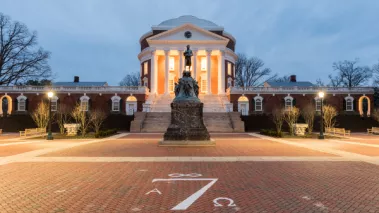Table of Contents
University of Virginia reportedly latest in rash of universities silencing RAs amid coronavirus panic

(Felix Lipov/Shutterstock.com)
FIRE has been reporting on a worrying trend of universities forbidding student resident assistants from speaking with the press. The first schools to hop on the bandwagon were the University of Missouri — which, to its credit, quickly corrected course — and Louisiana State University — which did not. Reports have now emerged that the University of Virginia has joined in on the unconstitutional action.
The Cavalier Daily, UVA’s student newspaper, reported last week on a policy that “restricts resident staffers from speaking to the press.” Specifically, according to the Daily, only administratively-appointed “co-chairs” may speak to the media about housing department issues or “their individual roles.”
While universities may prohibit RAs and other student employees from speaking to the media on behalf of the university or from revealing confidential student information, they may not place a blanket ban on RAs discussing their work with reporters.
If these reports are true, this blanket ban on RAs speaking with the media violates the First Amendment — and it’s also inconsistent with UVA’s laudable “green light” rating for its speech-related policies. That’s exactly what we told UVA in a letter sent Friday.
As we previously explained to LSU and Mizzou, while universities may prohibit RAs and other student employees from speaking to the media on behalf of the university or from revealing confidential student information, they may not place a blanket ban on RAs discussing their work with reporters. At public universities, RAs’ right to speak out as individuals about concerns with university policies, workplace conditions, or other issues of public concern is protected by the First Amendment. (While FIRE has yet to see a similar ban at a private university, RAs at private universities may enjoy similar protections under the National Labor Relations Act.)
It is unclear whether UVA’s ban on RAs speaking to the press is new, perhaps a response to the COVID-19 pandemic, or — like the policy seen at LSU, which dates back to at least 2012 — a demonstration of a longstanding snub of transparency.
What we do know, though, is that RAs believe that UVA’s policy currently silences them when they have concerns about personal and campus safety in light of what they view as insufficient COVID-19 protocols.
The censorship trend is further concerning because these policies don’t just harm RAs; they also harm the press and the public. Student media like The Cavalier Daily are especially affected when key sources are banned from talking to them about important community news. When journalists don’t have access to sources, the public is held back from its role of keeping public institutions accountable. Even when student journalists are able to secure anonymous interviews, relying on confidential sources — as The Daily has been forced to do in its reporting on the controversy surrounding the university’s response to COVID-19 — has been shown to negatively impact readers’ perceptions of credibility of a news source.
FIRE has written to UVA requesting copies of documents concerning its policies on RA interactions with the media. If the reports are accurate, UVA — along with other colleges and universities with similar restrictions — must revise its policy to be in line with its First Amendment obligations.
You can read FIRE's letter to UVA here:
Recent Articles
FIRE’s award-winning Newsdesk covers the free speech news you need to stay informed.

FIRE statement on immigration judge’s ruling that deportation of Mahmoud Khalil can proceed

FIRE welcomes Allison Hayward to board of directors

‘Executive Watch’: The breadth and depth of the Trump administration’s threat to the First Amendment — First Amendment News 465
